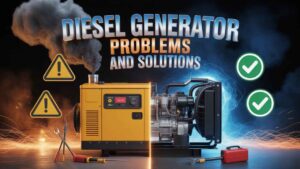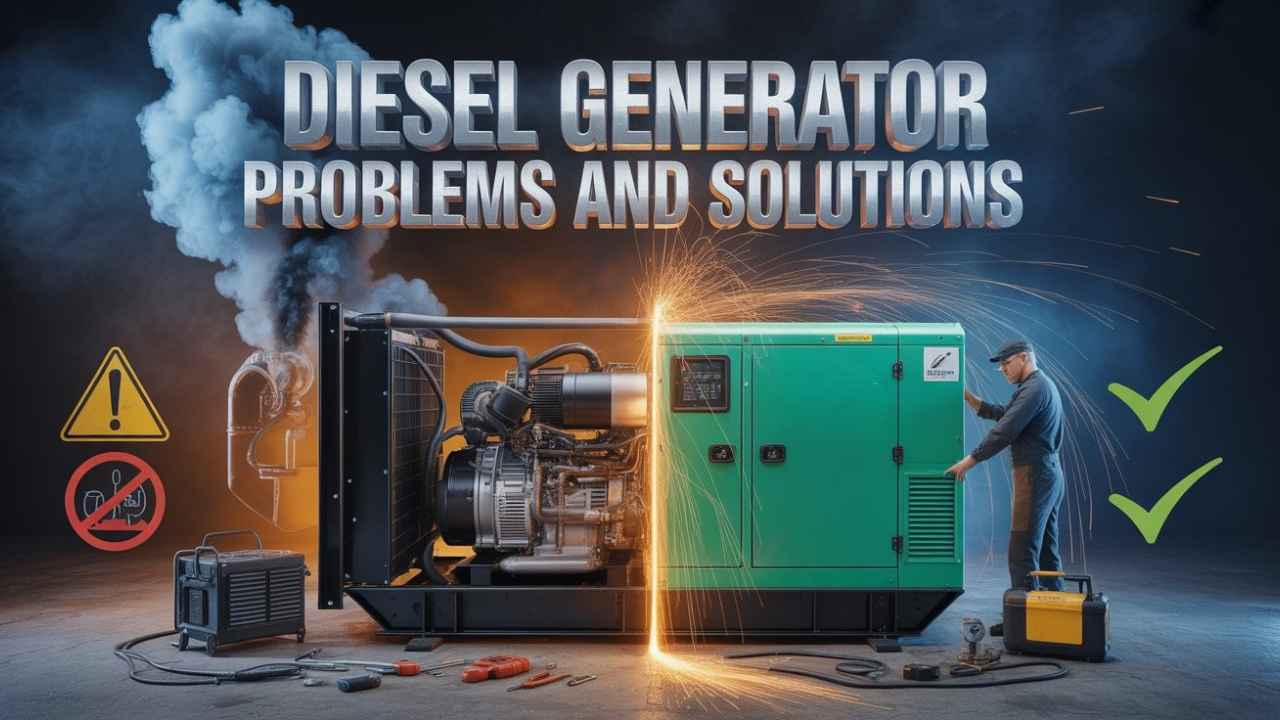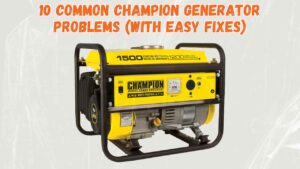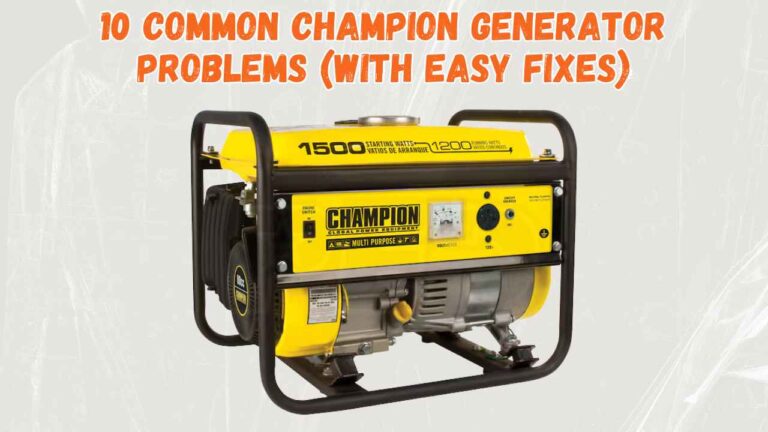Diesel generators are reliable machines, but like all equipment, they can face issues over time.
Understanding common diesel generator problems and solutions helps avoid breakdowns and ensures smooth operation.
From battery troubles to fuel issues, identifying these problems early can save time and money.
This guide simplifies key solutions to keep your generator running efficiently and without hassle.
Diesel Generator Problems (Short Overview)

Diesel generators can face common problems like dead batteries, clogged fuel filters, or coolant leaks.
These issues often lead to starting failures, reduced performance, or overheating.
Regular maintenance, like cleaning filters and checking fluid levels, helps prevent these problems and keeps your generator running smoothly.
Stay proactive to avoid unexpected breakdowns!
1. Generator Won’t Start
Causes:
Dead or weak battery connections often prevent generators from starting.
Low fuel levels, clogged fuel filters, or stale diesel fuel can also stop your generator cold.
Sometimes the issue is as simple as a tripped circuit breaker or loose wiring connection.
Fixes:
Check your battery voltage first; it should read around 12.6 volts when fully charged. Clean any corroded battery terminals and tighten loose connections.
Replace old fuel filters and ensure you have fresh diesel fuel in the tank. Inspect all electrical connections for damage or corrosion.
2. Engine Overheating
Causes:
Blocked air vents and dirty cooling fins prevent proper heat dissipation.
Low coolant levels, a faulty thermostat, or a damaged radiator cap can also cause overheating.
Running the generator in extremely hot weather without adequate ventilation makes the problem worse.
Fixes:
Clean debris from cooling fins and air intake vents regularly. Check coolant levels and top off as needed with the proper mixture.
Replace faulty thermostats and radiator caps if they’re not maintaining proper pressure.
Ensure your generator has adequate ventilation space around it.
3. Low Oil Pressure
Causes:
Insufficient oil levels are the most common culprit behind low oil pressure warnings.
Worn oil pump components, clogged oil filters, or using the wrong oil viscosity can also reduce pressure.
Internal engine wear may cause oil to leak past seals and gaskets.
Fixes:
Check oil levels immediately and add oil if needed. Never run a generator with low oil.
Replace dirty oil filters and change the oil using the manufacturer’s recommended grade.
Inspect for oil leaks around gaskets and seals, replacing damaged components as necessary.
4. Fuel System Problems
Causes:
Water contamination from condensation or poor fuel storage creates problems for diesel engines.
Algae and bacteria growth in fuel tanks, especially during long storage periods, can clog filters and injectors.
Old diesel fuel breaks down and forms deposits that restrict fuel flow.
Fixes:
Drain contaminated fuel and refill with fresh diesel from a reputable supplier. Add fuel stabilizer if you store diesel for extended periods.
Clean or replace fuel filters regularly and consider installing a water separator.
Use biocide treatments to prevent algae and bacteria growth in stored fuel.
Read Also:
Champion generator problems
5. Electrical System Failures
Causes:
Corroded electrical connections create resistance and voltage drops that affect generator performance.
Damaged wiring from rodents, weather exposure, or physical damage disrupts electrical flow.
Faulty control panels or voltage regulators can cause inconsistent power output.
Fixes:
Inspect all electrical connections for corrosion, cleaning and tightening as needed. Replace damaged wiring and protect connections from moisture and pests.
Test control panel functions regularly and replace faulty components promptly.
Use electrical contact cleaner on switch contacts and terminals.
6. Air Filter Blockage
Causes:
Dusty or dirty operating environments quickly clog air filters, especially on construction sites or in agricultural settings.
Neglecting regular maintenance allows debris to accumulate until airflow becomes severely restricted.
Paper filters tear or collapse under extreme conditions.
Fixes:
Inspect air filters monthly and replace them when dirty or damaged.
Clean reusable foam filters with soap and water, then re-oil before reinstalling.
Consider upgrading to heavy-duty filters in extremely dusty conditions. Keep spare filters on hand for quick replacement when needed.
7. Coolant Leaks
Causes:
Aging rubber hoses become brittle and develop cracks that leak coolant. Loose hose clamps allow coolant to seep out at connection points.
Corrosion in the radiator or water pump housing creates pinhole leaks that gradually worsen over time.
Fixes:
Replace cracked or swollen coolant hoses before they fail completely. Tighten loose hose clamps and replace damaged clamps with new ones.
Use radiator stop-leak as a temporary fix for minor leaks, but plan for permanent repairs.
Flush the cooling system regularly to prevent corrosion buildup.
8. Excessive Vibration
Causes:
Loose engine mounts allow the engine to move excessively during operation.
Unbalanced or damaged cooling fans create vibration that resonates through the entire generator.
Worn engine bearings or damaged internal components cause irregular operation and increased vibration.
Fixes:
Check engine mount bolts and tighten any loose hardware. Inspect cooling fans for damage or debris buildup that could cause imbalance.
Listen for unusual internal noises that might indicate bearing wear or other mechanical problems requiring professional repair.
9. Poor Power Output
Causes:
Dirty or faulty voltage regulators fail to maintain consistent output voltage. Worn generator windings reduce the unit’s ability to produce rated power.
Overloading the generator beyond its capacity causes voltage and frequency to drop below acceptable levels.
Fixes:
Test output voltage and frequency with a multimeter to verify actual performance. Clean voltage regulator contacts and replace faulty regulators if needed.
Calculate your total electrical load to ensure you’re not exceeding the generator’s capacity.
Have generator windings tested by a qualified technician if output remains low.
10. Exhaust System Issues
Causes:
Carbon buildup in exhaust pipes restricts gas flow and creates backpressure that hurts engine performance.
Damaged exhaust gaskets allow hot gases to escape, creating fire hazards.
Corroded exhaust components develop holes that allow toxic fumes to leak.
Fixes:
Clean carbon deposits from exhaust pipes and mufflers regularly.
Replace damaged exhaust gaskets to prevent dangerous gas leaks. Inspect exhaust components for corrosion damage and replace worn parts.
Ensure exhaust pipes are properly supported and not touching combustible materials.
FAQs
How often should I service my diesel generator?
Service your diesel generator every 100-200 hours of operation or annually, whichever comes first. Regular maintenance prevents most common problems and extends equipment life.
Why does my generator use more fuel than expected?
Excessive fuel consumption usually indicates engine problems like dirty air filters, worn injectors, or incorrect fuel mixture. Poor maintenance and overloading also increase fuel usage significantly.
Can I use heating oil in my diesel generator?
While heating oil and diesel fuel are similar, they have different additives and sulfur content. Use only diesel fuel designed for engines to avoid warranty issues and performance problems.
How long can diesel fuel be stored?
Diesel fuel typically lasts 6-12 months with proper storage and fuel stabilizers. Store fuel in clean, dry containers away from sunlight and temperature extremes for best results.
What size generator do I need for my home?
Calculate your essential electrical loads and add 25% for safety margin. Most homes need 15-20 kW for basic needs, while larger homes may require 25-30 kW generators.





